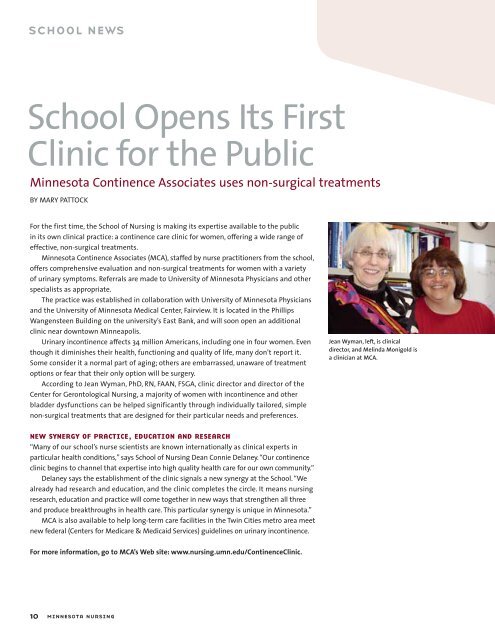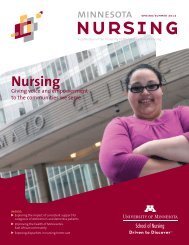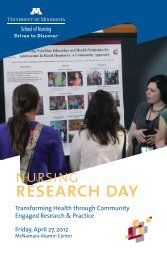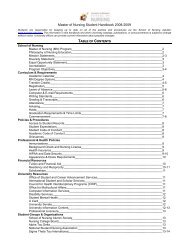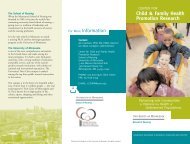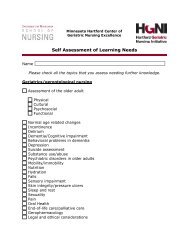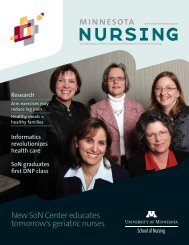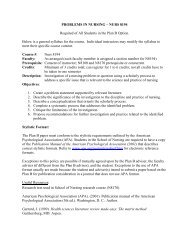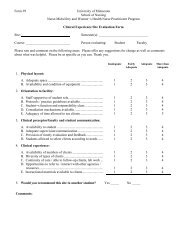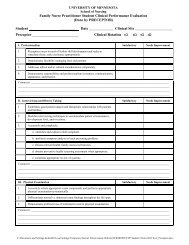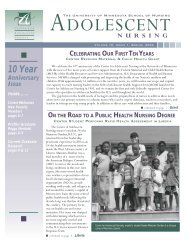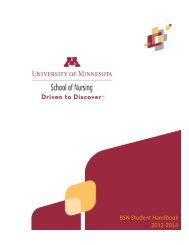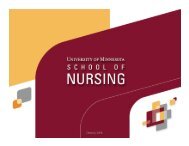Introducing Connie Delaney - School of Nursing - University of ...
Introducing Connie Delaney - School of Nursing - University of ...
Introducing Connie Delaney - School of Nursing - University of ...
Create successful ePaper yourself
Turn your PDF publications into a flip-book with our unique Google optimized e-Paper software.
school news<br />
<strong>School</strong> Opens Its First<br />
Clinic for the Public<br />
Minnesota Continence Associates uses non-surgical treatments<br />
BY MARY PATTOCK<br />
For the first time, the <strong>School</strong> <strong>of</strong> <strong>Nursing</strong> is making its expertise available to the public<br />
in its own clinical practice: a continence care clinic for women, <strong>of</strong>fering a wide range <strong>of</strong><br />
effective, non-surgical treatments.<br />
Minnesota Continence Associates (MCA), staffed by nurse practitioners from the school,<br />
<strong>of</strong>fers comprehensive evaluation and non-surgical treatments for women with a variety<br />
<strong>of</strong> urinary symptoms. Referrals are made to <strong>University</strong> <strong>of</strong> Minnesota Physicians and other<br />
specialists as appropriate.<br />
The practice was established in collaboration with <strong>University</strong> <strong>of</strong> Minnesota Physicians<br />
and the <strong>University</strong> <strong>of</strong> Minnesota Medical Center, Fairview. It is located in the Phillips<br />
Wangensteen Building on the university’s East Bank, and will soon open an additional<br />
clinic near downtown Minneapolis.<br />
Urinary incontinence affects 34 million Americans, including one in four women. Even<br />
though it diminishes their health, functioning and quality <strong>of</strong> life, many don’t report it.<br />
Some consider it a normal part <strong>of</strong> aging; others are embarrassed, unaware <strong>of</strong> treatment<br />
options or fear that their only option will be surgery.<br />
According to Jean Wyman, PhD, RN, FAAN, FSGA, clinic director and director <strong>of</strong> the<br />
Center for Gerontological <strong>Nursing</strong>, a majority <strong>of</strong> women with incontinence and other<br />
bladder dysfunctions can be helped significantly through individually tailored, simple<br />
non-surgical treatments that are designed for their particular needs and preferences.<br />
Jean Wyman, left, is clinical<br />
director, and Melinda Monigold is<br />
a clinician at MCA.<br />
NEW SYNERGY OF PRACTICE, EDUCATION AND RESEARCH<br />
“Many <strong>of</strong> our school’s nurse scientists are known internationally as clinical experts in<br />
particular health conditions,” says <strong>School</strong> <strong>of</strong> <strong>Nursing</strong> Dean <strong>Connie</strong> <strong>Delaney</strong>. “Our continence<br />
clinic begins to channel that expertise into high quality health care for our own community.”<br />
<strong>Delaney</strong> says the establishment <strong>of</strong> the clinic signals a new synergy at the <strong>School</strong>. “We<br />
already had research and education, and the clinic completes the circle. It means nursing<br />
research, education and practice will come together in new ways that strengthen all three<br />
and produce breakthroughs in health care. This particular synergy is unique in Minnesota.”<br />
MCA is also available to help long-term care facilities in the Twin Cities metro area meet<br />
new federal (Centers for Medicare & Medicaid Services) guidelines on urinary incontinence.<br />
For more information, go to MCA’s Web site: www.nursing.umn.edu/ContinenceClinic.<br />
10 minnesota nursing


